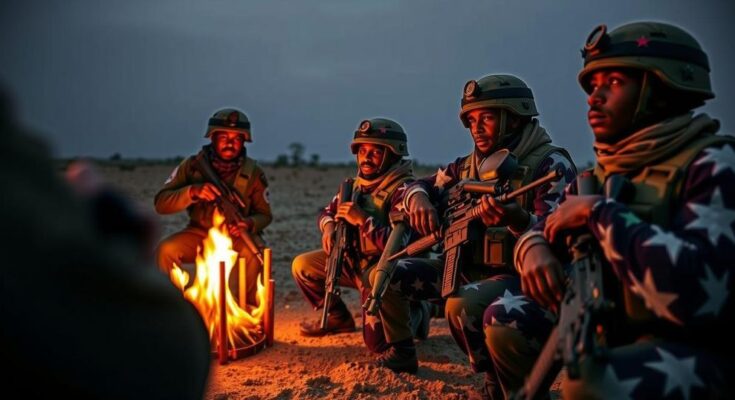The Central African Republic has seen the surrender of several hundred rebels following a peace agreement with Chad aimed at securing their joint border. Facing scarcity and pressure from government forces, these rebels are disarming as the C.A.R. prepares for postponed local elections. The government hopes to reintegrate combatants through disarmament initiatives and bolster security efforts through collaboration with Chad.
The Central African Republic (C.A.R.) reported that several hundred rebels have surrendered and relinquished their arms to government forces and United Nations troops. This development occurred shortly after C.A.R. entered into a collaborative agreement with Chad to enhance security along their shared 1,200-kilometer border. Government officials are optimistic about conducting local elections, previously postponed in October due to instability. The challenging living conditions and ongoing assaults by government troops compelled many insurgents to disarm and submit. Notably, Mloubo Etienne, a 36-year-old former fighter from the Union for Peace (UPC)—one of C.A.R.’s largest rebel factions—disclosed that starvation within the dense tropical forests near C.A.R.’s southern border precipitated his decision to surrender. He noted that many UPC members in the northern border region also intend to give up, particularly as Chad’s military has curtailed food supplies. Communication Minister Maxime Balalou confirmed that of the 105 rebels who disarmed in Bambari, a significant number were affiliated with the UPC or anti-balaka groups. Furthermore, in a separate initiative in Kouango, 36 additional fighters were disarmed, among whom were three women. Voluntary defectors will be transferred to the C.A.R. Center for Disarmament, Demobilization, and Reintegration for social and economic reintegration or training for service in the national army. The anti-balaka coalition has been active for a decade, with the government undertaking military operations against groups resisting disarmament. These efforts aim to facilitate the nation’s first local elections in 36 years, now scheduled for December 29, contingent upon improved security. Recent meetings between C.A.R. and Chad officials have resulted in a joint initiative to secure their border against rebel supplies. The C.A.R. government has asserted that rebels who continue to evade capture in the bush face lethal consequences unless they surrender their weapons to governmental or U.N. forces. The C.A.R. aims to convince at least half of the estimated 21,000 rebels to surrender by the conclusion of 2025.
The Central African Republic has faced prolonged instability and violence due to various rebel groups operating within its borders. The surge in insurgency has impeded socio-political growth and created adverse humanitarian conditions, necessitating extensive international intervention. Amid these challenges, the government seeks to galvanize peace through disarmament initiatives and diplomatic engagements. The recent collaboration with Chad aims to bolster the stability of both nations while resuming important political processes, such as long-overdue local elections.
In summary, the Central African Republic is witnessing significant milestones in its efforts to foster peace and stability, marked by the recent surrender of hundreds of rebels. These developments reflect the dire circumstances that rebel fighters are facing and the urgency of establishing a conducive environment for upcoming elections. The collaboration with Chad aims to consolidate security along the border and prevent further unrest, highlighting the governmental commitment to reintegrate former combatants into society while striving for sustained peace in the region.
Original Source: www.voanews.com




